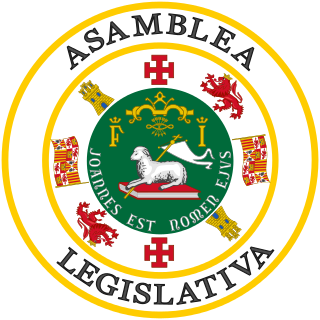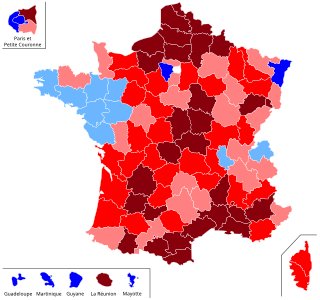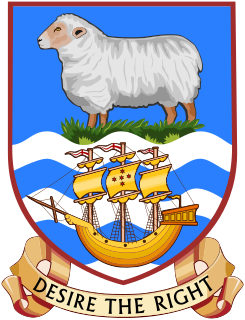Constitutional Referendum

The official result was more than 95% in favor of the new constitution. [2]
| Choice | Votes | % |
|---|---|---|
| | 1,057,390 | 95.48 |
| No | 49,978 | 4.52 |
| Total votes | 1,107,368 | 100.00 |
Two referendums were held in France on 6 September 1795: one adopting the Constitution of the Year III establishing the Directory, and another on the Two-Thirds Decree reserving two-thirds of the seats in the new Council of Five Hundred and Council of Ancients for former members of the National Convention. [1]

The official result was more than 95% in favor of the new constitution. [2]
| Choice | Votes | % |
|---|---|---|
| | 1,057,390 | 95.48 |
| No | 49,978 | 4.52 |
| Total votes | 1,107,368 | 100.00 |

Of the seven million eligible voters, only 4.49% of voters cast valid votes. [3]
| Choice | Votes | % |
|---|---|---|
| | 205,498 | 65.39 |
| No | 108,754 | 34.61 |
| Total votes | 314,252 | 100.00 |
"Udzima wa ya Masiwa" is the national anthem of the Comoros. Adopted in 1978, it was written by Said Hachim Sidi Abderemane, who also composed the music with Kamildine Abdallah.

The Legislative Assembly of Puerto Rico is the territorial legislature of the Commonwealth of Puerto Rico, responsible for the legislative branch of the government of Puerto Rico. The Assembly is a bicameral legislature consisting of an upper house, the Senate normally composed of 27 senators, and the lower house, the House of Representatives normally consisting of 51 representatives. Eleven members of each house are elected at-large rather than from a specific legislative district with all members being elected for a four-year term without term limits.

The French referendum on the Treaty establishing a Constitution for Europe was held on 29 May 2005 to decide whether France should ratify the proposed Constitution of the European Union. The result was a victory for the "No" campaign, with 55% of voters rejecting the treaty on a turnout of 69%.
Same-sex marriage in Switzerland has been legal since 1 July 2022. Legislation to open marriage to same-sex couples passed the Swiss Parliament in December 2020. The law was challenged in a referendum on 26 September 2021 by opponents of same-sex marriage and was approved with the support of 64% of voters and a majority in all 26 cantons. The law went into force on 1 July 2022. A provision of the law permitting same-sex marriages performed abroad to be recognised in Switzerland took effect on 1 January 2022.

The Provisional Government of the French Republic was the provisional government of Free France between 3 June 1944 and 27 October 1946, following the liberation of continental France after Operations Overlord and Dragoon, and lasting until the establishment of the French Fourth Republic. Its establishment marked the official restoration and re-establishment of a provisional French Republic, assuring continuity with the defunct French Third Republic.
A referendum concerning the establishment of the French Empire was held in France in November 1804. The officially announced result showed a nearly unanimous French electorate approving the change in Napoleon Bonaparte's status from First Consul to Emperor of the French. About seven million voters were called to participate, of which 47.2% did.
Ten referendums were held in Switzerland during 2008. The first two were held on 24 February on business tax reform and aircraft noise. A further three were held on 1 June on public information campaigns, naturalisation and health reform. The final five were held on 30 November on legalising cannabis, making the pension age flexible, restricting the right of appeal of associations against construction projects, amending the constitutional article on narcotics and eliminating the statute of limitations with respect to pornographic crimes against children.
Same-sex marriage in Cuba has been legal since 27 September 2022, after a majority of voters approved the legalization of same-sex marriage at a referendum two days prior. The Constitution of Cuba prohibited same-sex marriage until 2019, and in May 2019 the government announced plans to legalize same-sex marriage. A draft family code containing provisions allowing same-sex couples to marry and adopt was approved by the National Assembly of People's Power on 21 December 2021. The text was under public consultation until 6 June 2022, and was approved by the Assembly on 22 July 2022. The measure was approved by two-thirds of voters in a referendum held on 25 September 2022. President Miguel Díaz-Canel signed the new family code into law on 26 September, and it took effect upon publication in the Official Gazette the following day.
The 2009–2011 Catalan independence referendums, a series of non-binding and unofficial referendums, "popular votes", took place in municipalities around Catalonia. In them voters indicated whether they supported Catalan independence from Spain. The first such referendum took place in Arenys de Munt on 13 September 2009: there followed votes in Sant Jaume de Frontanyà on 12 December and in 166 other municipalities on 13 December. Another vote ensued in April 2011 in Barcelona.
A referendum is a direct vote in which an entire electorate is asked to either accept or reject a particular proposal. This article summarises referendum laws and practice in various countries.

In France there are two types of referendum:

A two-part constitutional referendum was held in Mauritania on 5 August 2017, having initially been planned for 15 July. Voters were asked whether they approve of proposed amendments to the constitution. Both proposals were approved by 86% of voters with a voter turnout of 54%.

A referendum on reforming the electoral system was held in the Falkland Islands on 24 September 2020, after being postponed from 26 March 2020 following the Coronavirus pandemic. Voters were asked if they wanted to replace the two existing electoral constituencies with a single constituency for the whole of the Islands. Although a majority of those who voted supported the change, the required two-thirds majority in both of the islands' constituencies was not achieved.
A republican empire is a form of government in which a country governed as a republic transitions into an empire. Examples of this process include the First French Republic, which became the First French Empire, as well as the Dutch Republic, which formed a Dutch Empire by seizing territory from Spain. The distinction between a republican empire and a more traditional monarchy is that the people are assumed to be the source of government power. In France, for example, voters were asked in an 1804 referendum whether they supported the creation of an empire.

The 2020 Algerian constitutional referendum was held on 1 November 2020. The subject of the referendum was a revision of the Algerian constitution, and it follows a series of protests known as Hirak.
The Ordinance of 9 August 1944 was a constitutional law enacted by the Provisional Government of the French Republic (GPRF) during the Liberation of France which re-established republican rule of law in mainland France after four years of occupation by Nazi Germany and control by the collaborationist Vichy regime.

The 2022 Tunisian constitutional referendum was a referendum held on 25 July 2022, organized by the Independent High Authority for Elections to allow the population to decide on a new constitution. The project had the support of the President of the Tunisian Republic, Kais Saied, and the referendum was organized one year after the beginning of the political crisis that began on 25 July 2021 and led to the dismissal of the Mechichi Cabinet and the freezing of the activity of the Assembly of the Representatives of the People, which was dissolved on 30 March 2022 based on Article 72 of the Constitution.
"Ungwana" ("Liberty"), also known as "Comor Masiwa Mane", was the national anthem of Comoros from 1975 or 1976 to 1978, when a coup by Ahmed Abdallah and Bob Denard took place, and it was replaced by the current anthem, "Udzima wa ya Masiwa". It was written and composed by Abdérémane Chihabiddine, better known as Abou Chihabi, a musician with the Comorian folk band Folkomor Océan. It was adopted under the Ali Soilih administration following a competition won by Chihabi.

A referendum was held on 25 September 2022 in Cuba to approve amendments to the family code of the Cuban Constitution. The referendum passed, legalizing same-sex marriage, same-sex adoption and altruistic surrogacy, among other things. Following the referendum, Cuba's family policies have been described as among the most progressive in Latin America.

The French constitutional Law of 2 November 1945 was an interim, transitional constitutional law that set a legal basis for government in France under the Provisional Government of the French Republic (GPRF) for one year until a new constitution was approved.